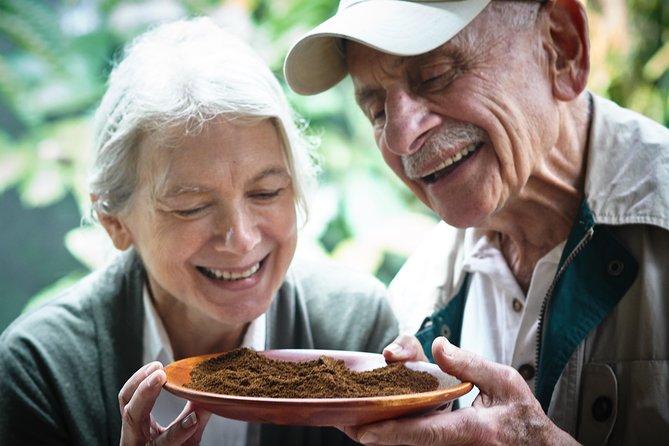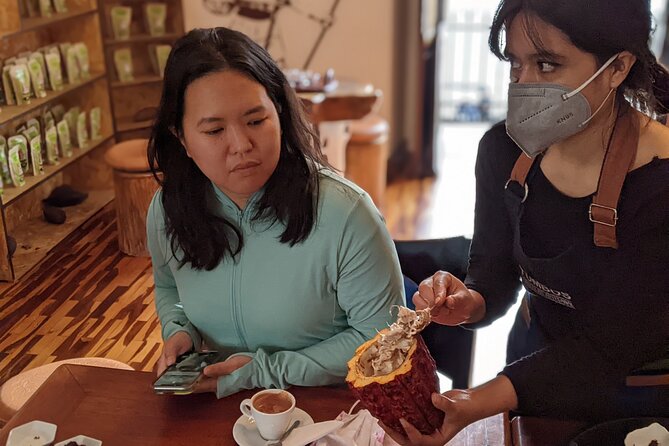The coffee scene in Quito reveals Ecuador’s finest beans and centuries-old traditions. Two standout experiences make it worth your time: A day trip to the Mindo cloud forest shows you the entire bean-to-cup process, while city-based tours connect you with local roasters and include hands-on coffee preparation workshops. I especially love the Mindo tour for its combination of nature and coffee education – you’ll see coffee growing in its natural habitat while learning from passionate farmers. The city tours get my vote for their intimate look at Quito’s café culture and the bonus of learning to make traditional empanadas. Let’s explore the best coffee tours available in Ecuador’s capital.
Key Points
- Immersive coffee and chocolate tour in the Mindo cloud forest, led by expert guides and including farm visits, tastings, and a themed lunch.
- Afternoon coffee and culinary tour in Quito, featuring a visit to a coffee roastery, chocolate tasting, and hands-on empanada cooking class.
- Private culinary experience in Quito’s historic center, with the opportunity to learn traditional preparations and sample local snacks.
- Accessibility and personalization options, including wheelchair and stroller accessibility, private transportation, and customized itineraries.
- Highly rated tours known for knowledgeable guides and memorable experiences that combine culture and culinary delight.
Coffee & Cacao Private Experience From Quito

What better way to learn about Ecuador’s coffee and cacao culture than with a private day trip from Quito to the Mindo cloud forest? This experience offers a chance to learn from a coffee and chocolate expert, visiting a cacao farm, coffee farm, and hummingbird viewpoint.
The tour includes the chocolate-making process, tastings, and a themed lunch at a chocolate house.
You’ll start with a hot drink stop and scenic views of the Ecuadorian cloud forest, followed by a tour of the cacao farm with a tasting and a surprise.
Then, you’ll enjoy a thematic lunch at the chocolate house before visiting the coffee farm for a tour and tasting.
Throughout the day, you’ll have an English-speaking guide and private round-trip transportation from your Quito hotel.
With 9 reviews averaging 4.9/5 and highlights like knowledgeable guides and delicious experiences, this coffee and cacao tour is a must-try for anyone seeking an immersive and memorable adventure.
Read our full review: Coffee & Cacao Private Experience From Quito Review
Book now: Check availability
Afternoon Coffee in Quito – Foodie Tour With Empanada Cooking Class

Enjoy Quito’s vibrant coffee and culinary culture on this private afternoon tour.
Explore the historic center, visiting a coffee roastery and indulging in a chocolate tasting at a local chocolatier. Learn the traditional Quiteño method of coffee preparation using a chuspa, then sip on a refreshing Canelazo cocktail made with Naranjilla juice, spices, and liquor.
The highlight of the tour is the empanada cooking class, where you’ll learn to make the cheese-filled empanadas de viento, fluffy quimbolitos cakes, and the local corn treat, humitas.
Savor the authentic Ecuadorian flavors as you create these delectable dishes. Throughout the experience, you’ll sample local snacks, including the liquor-filled mistelas candies.
With private transportation, wheelchair and stroller accessibility, and tips for the guide and chef included, this tour offers a personalized and immersive culinary adventure in the heart of Quito.
Read our full review: Afternoon Coffee in Quito – Foodie Tour With Empanada Cooking Class Review
Book now: Check availability
Frequently Asked Questions
What Are the Health Benefits of Drinking Coffee?
Drinking coffee can provide various health benefits. It’s a rich source of antioxidants, which may help reduce the risk of type 2 diabetes, Parkinson’s disease, and certain types of cancer. Plus, coffee consumption is linked to improved cognitive function and increased energy levels.
How Can I Become a Professional Coffee Taster?
To become a professional coffee taster, one must undergo rigorous training, develop a discerning palate, and hone their sensory skills. This typically involves earning certifications, gaining industry experience, and continuously expanding one’s knowledge of coffee origins, processing, and flavor profiles.
What Is the Difference Between Arabica and Robusta Coffee?
The key difference between arabica and robusta coffee is that arabica beans have a smoother, more complex flavor, while robusta beans have a stronger, more bitter taste. Arabica also generally has higher acidity and less caffeine than robusta.
Can I Bring Coffee Beans Back From Ecuador?
Yes, travelers can bring coffee beans back from Ecuador. However, it’s important to check the local and international regulations regarding the export and import of agricultural products to ensure compliance. Bringing back coffee souvenirs is generally allowed, but travelers should be mindful of any restrictions.
What Is the Optimal Water Temperature for Brewing Coffee?
The optimal water temperature for brewing coffee is between 195°F and 205°F. This temperature range extracts the coffee’s full flavor and aroma without burning the beans. Using water that’s too hot or too cold can result in a poor-tasting cup of coffee.
The Sum Up
Quito offers coffee aficionados a range of unique experiences. From private coffee and cacao tours to hands-on empanada cooking classes, visitors can explore the city’s thriving coffee culture. With knowledgeable guides and carefully curated itineraries, these tours provide an in-depth look at the region’s premium coffee and cacao production. Whether you’re a casual drinker or a true connoisseur, Quito’s coffee excursions promise to delight the senses and expand your appreciation for this beloved beverage.
